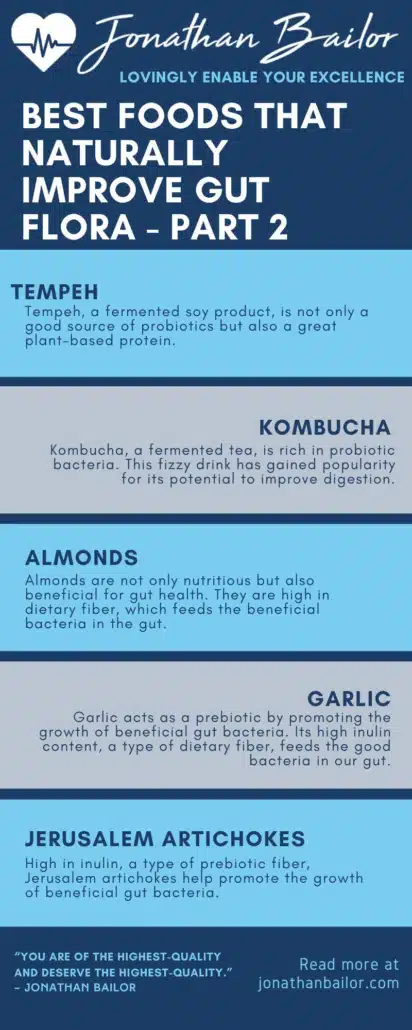10 Best Foods That Naturally Improve Gut Flora
Have you ever considered the bustling world inside your gut? In this gut health guide, Jonathan Bailor discusses this vibrant ecosystem, teeming with trillions of microorganisms that play a pivotal role in your overall health. Just like a flourishing garden needs the right balance of nutrients and care, your gut flora thrives on specific foods that foster a healthy and balanced microbial environment.
Understanding gut health isn’t just about complex scientific terms; it’s about recognizing the simple choices we make every day that contribute to our well-being. In this journey towards a healthier gut, I’m excited to share with you some of the most effective foods that naturally enhance your gut flora. These foods are not just potent health boosters but also easily accessible and delicious additions to your daily meals.
A healthy gut microbiome impacts more than just physical health; it can also affect mood and immunity. For many of us, especially as we embrace the wisdom of our years, maintaining a robust gut flora becomes even more crucial. The great news is that by integrating these select foods into your diet, you’re taking a significant step towards better gut health and, in turn, a happier, more vibrant life.
As you read on, you’ll discover the remarkable powers of these everyday foods. They’re not magical superfoods from distant lands, but familiar, nutritious choices that align beautifully with a balanced, health-focused lifestyle. They’re about relishing nature’s natural flavors, nourishing your body, and cherishing the simple joy of eating well.
So, get ready to embark on a delightful and transformative journey towards optimal gut health. These foods are not just ingredients but nature’s gifts to help you flourish. And remember, sharing is caring! If you find this information helpful, don’t hesitate to spread the word. Your friends and family might just thank you for the nudge towards a happier gut and a healthier life.
The Cornerstone of Well-being: Understanding Your Gut Microbiome
In the intricate tapestry of our body’s health, the gut microbiome emerges as a key player, often underestimated yet immensely influential.
This bustling micro-world inside our digestive system is more than just a digestive aid; it’s a cornerstone of our overall well-being. The diverse community of healthy gut microbes, primarily bacteria, residing in our gut has far-reaching effects, from bolstering our immune system to influencing our mood and mental health. They may even help control blood sugar, a major risk factor for diabetes if elevated.
These microscopic inhabitants work tirelessly, not just breaking down food but also extracting and synthesizing essential nutrients and vitamins that our bodies rely on. They serve as vigilant gatekeepers, combating harmful pathogens and maintaining the delicate balance of our internal ecosystem.
By nurturing our gut microbiome through mindful eating, we don’t just support digestion; we foster a holistic health shield that guards various aspects of our well-being. In essence, a flourishing gut microbiome is akin to a harmonious symphony, with each microbe playing its part in the grand orchestra of our health.
Feeding Harmony: The Impact of Food on Gut Flora
The foods we consume are pivotal in nurturing or disrupting our gut flora, akin to how a gardener tends to a garden.
Nutrient-rich, fiber-abundant foods act as nourishment, fostering the growth of beneficial bacteria that contribute to our health. These beneficial microbes thrive on the fibers and complex carbohydrates found in fruits, vegetables, and legumes, transforming them into vital nutrients like short-chain fatty acids, which are crucial for gut health.
In addition, probiotic foods, like yogurt and fermented foods, introduce beneficial bacteria directly into the gut, supporting diversity and resilience in our microbiome. Antioxidant-rich foods also play a role, offering protection against harmful bacteria and supporting the gut barrier.
Processed foods, on the other hand, are high in sugar and unhealthy fats, which can promote the growth of less favorable bacteria, leading to an imbalance. This imbalance, known as dysbiosis, can pave the way for digestive discomfort, weakened immunity, and even mood fluctuations.
Ultimately, the dietary choices we make can either foster a flourishing microbiome, enhancing our health, or disrupt this delicate ecosystem, leading to long-term health consequences.

Feeling Better Is Priceless, That's Why We Don't Put A Price On It!
“It’s Like A Free and Medically Valid Version of Noom and Weight Watchers Online”
~ Dr. Doctor Matthew Oleshiak, MD
Click the 'LEARN MORE' button below for free lifetime access to the fast fix program developed by Jonathan and top Ivy League Medical Doctors
LEARN MOREP.S. It's not a free trial. It's not part of the program for free. The entire program is free, forever, for real! No credit card needed.
Top 10 Foods for a Thriving Gut Microbiome
Embarking on the journey to enhance gut health can be both exciting and nourishing. The foods we eat play a significant role in the health and balance of our gut microbiome. This delicate ecosystem within us thrives on specific nutrients, which can be abundantly found in a variety of foods. From the tangy zest of fermented foods to the subtle richness of nuts and roots, each item on our list is not just a treat for your palate but a boon for your gut health.
These top 10 foods are more than just ingredients in your kitchen; they are allies in your quest for a healthier, happier gut. As we explore these foods, remember that each one brings its own unique properties and benefits, working in harmony to support a vibrant and diverse gut flora.
1. Yogurt
Yogurt, particularly those rich in live cultures, is a probiotic powerhouse. These live cultures are beneficial bacteria that reside in our gut, aiding digestion and bolstering our immune system.
Regular yogurt consumption can help maintain a balanced microbiome, ensuring that good bacteria thrive. Incorporating it into your balanced diet can provide you with a significant amount of both protein and calcium, making it a highly nutritious option.
2. Kefir
Kefir, a fermented milk drink, is teeming with probiotics. Its unique fermentation process yields diverse bacteria and yeast, enhancing gut flora diversity. Kefir is also generally well-tolerated by people who are lactose intolerant, as the fermentation breaks down much of the lactose.
Additionally, it’s a good source of vitamins and minerals, contributing to overall health.
3. Sauerkraut
Fermented from cabbage, sauerkraut is rich in both probiotics and dietary fiber. The fermentation process not only produces beneficial bacteria but also enhances the bioavailability of nutrients.
Regular consumption of sauerkraut can aid digestion and support a healthy immune system. Ensure you choose raw, unpasteurized sauerkraut to get the most probiotic benefits.
4. Kimchi
This Korean staple, made from fermented vegetables, mainly cabbage, is another probiotic-rich food. The fermentation process fosters a thriving community of good bacteria, while the vegetables themselves provide fiber and vitamins.
Kimchi’s spicy taste and crunchy texture also add a delightful zing to meals, making it a pleasure to consume for gut health.
5. Miso
Miso, a staple in Japanese cuisine, is made from fermented soybeans. It’s a rich source of probiotics, promoting gut health and aiding digestion.
Miso also contains essential minerals and is a good source of vitamins B, E, and K. Its savory flavor, known as umami, adds depth to soups and sauces.

6. Tempeh
Tempeh, a fermented soy product, is not only a good source of probiotics but also a great plant-based protein. The fermentation process breaks down phytic acid, making it easier to digest and allowing the body to absorb more nutrients.
Tempeh’s firm texture and nutty flavor make it an excellent meat substitute in various dishes.
7. Kombucha
Kombucha, a fermented tea, is rich in probiotic bacteria. This fizzy drink has gained popularity for its potential to improve digestion and immunity. It’s also a source of antioxidants, which can protect the body from oxidative stress.
However, moderation is key, as kombucha can contain sugar and small amounts of alcohol as byproducts of fermentation.
8. Almonds
Almonds are not only nutritious but also beneficial for gut health. They are high in dietary fiber, which feeds the beneficial bacteria in the gut.
Almonds also contain polyphenols, compounds that help promote the growth of beneficial gut bacteria and inhibit harmful ones.
9. Garlic
Garlic acts as a prebiotic by promoting the growth of beneficial gut bacteria. Its high inulin content, a type of dietary fiber, feeds the good bacteria in our gut.
Additionally, garlic has natural antibacterial and antifungal properties, helping to maintain a healthy gut flora balance.
10. Jerusalem Artichokes
High in inulin, a type of prebiotic fiber, Jerusalem artichokes help promote the growth of beneficial gut bacteria.
This root vegetable supports a healthy microbiome and aids in digestion. They are also a good source of iron and potassium, contributing to overall nutritional intake.

Gut Health Essentials: Your Questions Answered
Q1: What is the gut microbiome, and why is it important?
The gut microbiome is a vital and complex community of microorganisms residing in our digestive tract that plays a crucial role in our overall health. These microbes aid in breaking down food, synthesizing essential nutrients, and forming a barrier against harmful pathogens. A balanced gut microbiome is essential for efficient digestion, a robust immune system, and even mood and mental well-being.
Maintaining a healthy microbiome is key to ensuring our body functions optimally, highlighting the importance of gut health in our daily lives.
Q2: How does diet affect gut health?
Diet is a major influence on gut health. Foods rich in fiber, such as fruits, vegetables, and legumes, feed the beneficial bacteria in our gut, promoting a balanced microbiome. Probiotic-rich foods like yogurt and fermented vegetables introduce beneficial bacteria directly into our system.
Conversely, a diet high in processed foods and sugar can lead to an imbalance, fostering the growth of harmful bacteria. Thus, our dietary choices can significantly impact the health of our gut microbiome.
Q3: Can stress affect my gut health?
Yes, stress can have a significant impact on your gut health. Stress triggers a response in your body that can disrupt the balance of your gut microbiome, leading to issues like increased gut sensitivity, altered gut motility, and an imbalance in gut bacteria.
Managing stress through relaxation techniques, adequate sleep, and a balanced lifestyle can help maintain a healthy gut.
Q4: What are the signs of an unhealthy gut?
An unhealthy gut can manifest in various ways, including digestive issues like bloating, gas, constipation, or diarrhea. It may also lead to more systemic symptoms such as fatigue, headaches, and skin problems like eczema. In some cases, an imbalanced gut microbiome can affect mood and cognitive functions.
If you’re experiencing these symptoms, it may be beneficial to evaluate your diet and lifestyle choices that impact your gut health.
Q5: Can improving gut health aid in weight management?
Yes, improving gut health can play a role in weight management. A healthy gut microbiome aids in efficient digestion and nutrient absorption, which can contribute to a feeling of fullness and reduce cravings. Some studies suggest that a balanced gut microbiome may also influence metabolism, potentially aiding in weight management.
Incorporating a variety of nutrient-rich foods that support gut health can be a valuable part of a comprehensive weight management strategy.
Embrace and Share the Gift of Gut Health
As we wrap up our journey through the realm of gut health, remember that each food choice is a step towards a healthier you. The power to nurture your gut flora lies in your hands through the simple yet profound act of mindful eating.
Let this knowledge be not just your guide but a shared treasure with your loved ones. Spread the word on social media platforms and through email. Share the gift of gut health far and wide, because a healthy gut is the foundation of overall well-being. Together, let’s embark on this path of health and vitality, one meal at a time.
Feeling Better Is Priceless, That's Why We Don't Put A Price On It!
“It’s Like A Free and Medically Valid Version of Noom and Weight Watchers Online”
~ Dr. Doctor Matthew Oleshiak, MD
Click the 'LEARN MORE' button below for free lifetime access to the fast fix program developed by Jonathan and top Ivy League Medical Doctors
LEARN MOREP.S. It's not a free trial. It's not part of the program for free. The entire program is free, forever, for real! No credit card needed.




